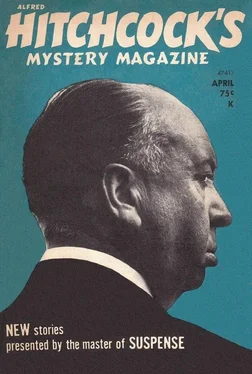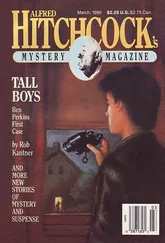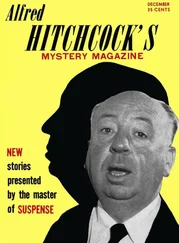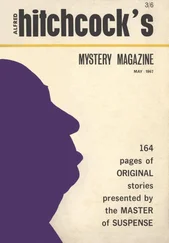Роберт Колби - Alfred Hitchcock’s Mystery Magazine. Vol. 17, No. 4, April 1972
Здесь есть возможность читать онлайн «Роберт Колби - Alfred Hitchcock’s Mystery Magazine. Vol. 17, No. 4, April 1972» весь текст электронной книги совершенно бесплатно (целиком полную версию без сокращений). В некоторых случаях можно слушать аудио, скачать через торрент в формате fb2 и присутствует краткое содержание. Город: Riviera Beach, FL, Год выпуска: 1972, Издательство: H.S.D. Publications, Жанр: Детектив, на английском языке. Описание произведения, (предисловие) а так же отзывы посетителей доступны на портале библиотеки ЛибКат.
- Название:Alfred Hitchcock’s Mystery Magazine. Vol. 17, No. 4, April 1972
- Автор:
- Издательство:H.S.D. Publications
- Жанр:
- Год:1972
- Город:Riviera Beach, FL
- ISBN:нет данных
- Рейтинг книги:5 / 5. Голосов: 1
-
Избранное:Добавить в избранное
- Отзывы:
-
Ваша оценка:
- 100
- 1
- 2
- 3
- 4
- 5
Alfred Hitchcock’s Mystery Magazine. Vol. 17, No. 4, April 1972: краткое содержание, описание и аннотация
Предлагаем к чтению аннотацию, описание, краткое содержание или предисловие (зависит от того, что написал сам автор книги «Alfred Hitchcock’s Mystery Magazine. Vol. 17, No. 4, April 1972»). Если вы не нашли необходимую информацию о книге — напишите в комментариях, мы постараемся отыскать её.
Alfred Hitchcock’s Mystery Magazine. Vol. 17, No. 4, April 1972 — читать онлайн бесплатно полную книгу (весь текст) целиком
Ниже представлен текст книги, разбитый по страницам. Система сохранения места последней прочитанной страницы, позволяет с удобством читать онлайн бесплатно книгу «Alfred Hitchcock’s Mystery Magazine. Vol. 17, No. 4, April 1972», без необходимости каждый раз заново искать на чём Вы остановились. Поставьте закладку, и сможете в любой момент перейти на страницу, на которой закончили чтение.
Интервал:
Закладка:
“What?”
“Their concept of justice, like the behavior of the cheetahs, is uncomplicated, direct, precise and economical,” Krenden said. “In most other known societies you’d be sure to find the customary trappings of judges, prosecutors, jurors and all the rest surrounding the workings of crime. But not here. This tribe is still living in the Stone Age. Arson, murder — all the crimes civilized people recognize, plus any other act they have designated a crime — merit the same simple sentence: death. You may not like or agree with their methods, but you have to admit they’re effective. No wasted motion, no legalistic rigamarole.”
Harley looked away. “I’m not interested in all that. I’m only interested in getting out of here,” he stated in a flat nasal whine.
“In our situation,” Krenden observed, undaunted, “there are two principal topics of conversation: one, escape; two, what brought us here. Forget the first for a moment if you can, and tell me why you’re here.”
Harley gave a brief, brittle laugh. “I was working as a safari guide for rich white hunters — some with guns, some with cameras — all with money. But the season was over — the rains, you know.”
“I know,” Krenden said, remembering the endless rains that had made him begin to feel like a fish.
“There was this guy I met in a bar. He said he’d been out here once. He said the natives had silver ornaments. He said they must have found a pretty rich vein out here, so I came out and took a look around. The guy was right. Only those monkeys caught me up in their tunnel about an hour ago.”
“A thief,” Krenden mused.
“What will happen to me?”
“Theft merits the death sentence, too — here.”
“It’s not fair!” Harley howled.
Krenden shrugged, running his eyes over his companion’s thick torso and several chins. “Fairness,” he said sadly, “has nothing to do with it. This is not civilization — at least not as we know it. It’s a whole new ball game here, and they,” he said, pointing to the natives moving about the small village, “make the rules for the players.”
Harley grunted something and wiped glistening beads of sweat from his forehead.
“We have only ourselves to blame,” Krenden continued. “We should have minded our own business.”
“But it’s not fair, dammit! They got no right to all that silver. What do they do with it? Nothing, that’s what. Nothing important, anyway.”
“They fashion their idols from it. Their gods — and devils,” Krenden explained.
“That’s what I said. Nothing important.”
“It’s important to them.”
“They’ve got more statues and altars — all of them silver — than you can count. What do they want with all that stuff?”
“I was an anthropologist,” Krenden said dreamily, “a long time ago. I was part of a team studying the tribe’s social structure, their language — that sort of thing. There were three of us — my wife, myself and a guide. We learned that these are a people who conserve every item of possible value. Their environment, as you know, is a very harsh one. The elements are their enemies. Twice, we determined, their entire village was wiped out by storms, so they have learned to conserve. They find a use for everything. Everything has a function in their scheme of things. Nothing is wasted.”
“They’re stingy, you mean.”
A wan smile creased Krenden’s face, momentarily disguising his impatience. “Stingy? Just a label. No, they’re not stingy. It’s all a matter of conditioning. With their conditioning-experienced over countless generations — they became a people who conserved. Call them insecure, if you like, but not stingy. They’ve got whole — you could call them warehouses — stuffed full of canoes they’ve made, thatch for their roofs... You name it, they’ve stored it. It makes them feel safer just to know the stuff is there. For them, it’s a simple matter of survival tactics.”
“They’re vicious little monkeys!” Harley roared, evoking no response whatsoever in the stone-faced guard outside the stockade. He stripped off his sleeveless shirt.
“How’d you get in here?” he asked Krenden.
Krenden shrugged. “I killed my wife.”
“You what? ”
“I killed my wife. The man I hired to guide us was, I finally discovered, guiding her in directions I didn’t like. By killing her, I destroyed something — someone — valuable, in the eyes of the natives. I’d broken one of their major taboos — the edict against killing.”
“But why should they care? It was none of their business.”
“It happened here in their village. Their gods demanded punishment for my crime. So they put me in here, and here I’ve been ever since — for the past five months.”
“Didn’t anybody come looking for you?”
Krenden shook his head. “My wife and I planned to spend at least eighteen months here living with the tribe. The private foundation that funded our expedition will have no reason to suspect that anything is wrong for a long time yet.”
“You know something?” Harley moaned. “I’m scared.”
Krenden gave him a pitying glance. “Everyone who comes here is.” He placed one hand on Harley’s shoulder, letting it slide down the man’s arm which seemed almost boneless beneath its corpulence.
“There have been others?”
“Yes. Other natives poaching on the tribe’s territory, escaped convicts from the penal colony down river. Yes, there have been others.”
“Listen, Krenden. Maybe together, you and I could—”
Krenden shook his head and looked away. “No one escapes once he’s put in here,” he stated flatly. “We all stay here until we die sooner or later from the heat, the poisonous insects, the cheetahs — whatever.”
Harley studied Krenden’s gaunt frame, the lank hair, the strangely lurid and yet sad eyes. “That word they got painted on that piece of bark right outside,” he began. “What does it mean anyway?”
“Bogindo? It’s one of their words.”
“Yeah, but what does it mean? I don’t know their language like I guess you do.”
“Killer-of-his-kind,” Krenden answered evenly.
“Oh, sorry. I didn’t mean to bring that up again.”
Krenden waved Harley’s apology aside. “The keynote of their culture, as I’ve said, is definitely economy. It even, affects the structure of their language. One of their words usually means several things. Take bogindo, for example. It means killer-of-his-kind, as I said. But it also carries other shades of meaning. It also means murderer, slayer, butcherer and executioner.”
Krenden’s eyes glowed oddly. “Executioner,” he repeated softly, as if savoring the word. Suddenly, he dropped to his knees and thrust one thin hand into the pile of sticks beside the fire. Moving like a dancer dreaming, he rose with the long knife in his hand and swiftly plunged it into Harley’s heart. A soft, startled cry, a miniature protest, escaped from Harley’s lips before he sank lifeless to the ground at Krenden’s feet.
Outside the stockade, the guard continued to study the fleecy clouds in the sky.
Later, when it was over, Krenden banked the fire and removed the spit. He returned the knife to its hiding place in the pile of sticks.
He really had to hand it to them, he decided with bitter admiration. They’d even found a use for their bogindo — and a way to feed him without unnecessary expenditure.
Night of the Twisters
by James Michael Ullman
Survival often depends on finding a weak spot in the armor.
All afternoon the air had been humid and oddly still, with the temperature hovering in the nineties. Old-timers, wiping their brows and gazing at dark thunderheads gathering in the southwestern sky, knew they were in for trouble.
Читать дальшеИнтервал:
Закладка:
Похожие книги на «Alfred Hitchcock’s Mystery Magazine. Vol. 17, No. 4, April 1972»
Представляем Вашему вниманию похожие книги на «Alfred Hitchcock’s Mystery Magazine. Vol. 17, No. 4, April 1972» списком для выбора. Мы отобрали схожую по названию и смыслу литературу в надежде предоставить читателям больше вариантов отыскать новые, интересные, ещё непрочитанные произведения.
Обсуждение, отзывы о книге «Alfred Hitchcock’s Mystery Magazine. Vol. 17, No. 4, April 1972» и просто собственные мнения читателей. Оставьте ваши комментарии, напишите, что Вы думаете о произведении, его смысле или главных героях. Укажите что конкретно понравилось, а что нет, и почему Вы так считаете.












